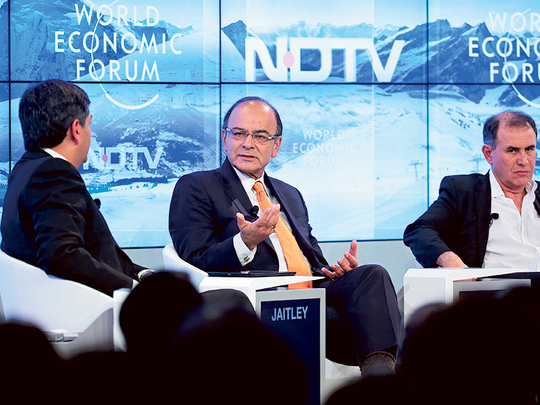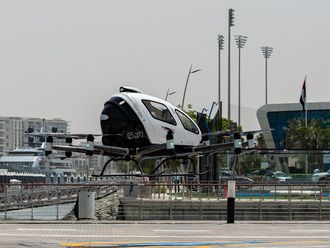
Davos: India is able to face a tough global economic outlook with confidence although Indian businesses need more investment and the banks should take a more active role in providing liquidity.
The Davos panel on India included the notoriously gloomy Nouriel Roubini, Professor of Economics at New York University, but even he agreed that global factors will have less impact on Indian growth, although he managed to point out that with the global economy in a downturn Indian exports will be hit and the rupee has fallen, but he agreed that progress has been made.
It was not surprising that Arun Jaitley, India’s Minister of Finance, took a much more confident line, pointing out that if India can achieve growth of 7.5 per cent despite the global slowdown, two bad monsoons and more reform coming in infrastructure and power, then it should be able to add another 1.5 per cent with some confidence.
Jaitley pointed out that global volatility will be the norm that everyone has to live with, and in the current situation Indian exports have shrunk but more by value than volume, and the currency has been impacted.
Sunil Bharti Mittal, chairman of Bharti Enterprises, opened up the topic of the fall in the oil price which he said was a great benefit for India as it has been able to saved on its fuel subsidies and generate a lot of excess cash, and he asked Jaitley to explain if it had all been used.
Jaitley insisted that that the benefit of the lower oil prices has been fully utilised and has spread in three major areas. First, the subsidies on fuel and LPG cooking gas have come down to great benefit of the consumers, and second the benefit has been shared with some of the oil companies but a third and large share has also been put into infrastructure projects like building better trunk roads in rural areas.
Jaitley said that the government had to spend money to start off these infrastructure projects as the first 17 tenders for highways did not generate any interest but now they are booming and infrastructure projects attract the keen attention of businesses.
Mittal also opened up on the necessity of businesses to reinvest in their people and new projects, but added that this was not happening as many businesses are over stretched with too much debt, and people are holding from spending. He urged Jaitley to start a dialogue with the banks to encourage them to make more liquidity available.
Jaitley said that the government has a plan to recapitalise the banks, and will add to that plan if required, but he also made clear that the banks will have to close on some of their debtors rather than continuing to carry them, and he mentioned stressed sectors like steel and power.
Roubini argued that the Chinese slowing down was a very important global factor as it might easily become a hard landing leading to a crash, devaluation of China’s currency, and other effects all of which would have a significant impact for emerging economies.
The Chinese downturn has already developed a situation that could have a direct impact on India, said Roubini has China now has considerable excess capacity in industries like steel, plastics and metals and it will dump its products onto the markets, giving serious issues to Indian competitors.
The session closed with a lively debate on the importance of installing a broadband network through out India, and when Jaitley mentioned some problems at state level like getting access and right of way, Chandrababu Naidu, Chief Minister of Andhra Pradesh, jumped to his feet from the audience and insisted that it was possible if state governments wanted to make it happen, mentioning several new initiatives he was implementing in Andhra Pradesh to get every house connected in the near future.












